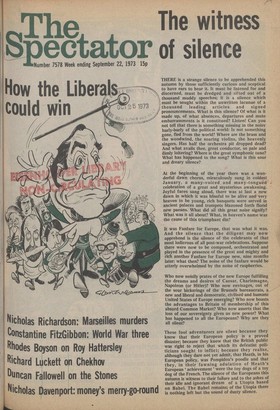THERE is a strange silence to be apprehended this autumn
by those sufficiently curious and sceptical to have ears to hear it. It must be listened for and discerned, must be dredged and sifted out of a thousand muddy speeches; it is a silence which must be sought within the unwritten lacunae of a thousand leading articles and signed pronouncements. What is this silence? Of what is it made up, of what absences, departures and mute embarrassments is it constitued? Listen! Can you not tell that there is something missing in the noisy hurly-burly of the political world: Is not something gone, fled from the world? Where are the brass and the woodwind, the soaring violins, the heavenly singers. Has half the orchestra pit dropped dead? And what avails thee, great conductor, so pale and dimly loitering? Where is the great symphonic tune? What has happened to the song? What is this sour and dreary silence?
At the beginning of the year there was a wonderful dawn chorus, miraculously sung in coldest January, a many-voiced and many-tongued celebration of a great and mysterious awakening. Joyful faces sang aloud, there was at last a new dawn in which it was blissful to be alive and very heaven to be young, rich banquets were served in ancient palaces and trumpets blazoned forth florid new paeans. What did all this great noise signify? What was it all about? What, in heaven's name was the cause of this triumphant din?
It was Fanfare for Europe, that was what it was. And the silence that the diligent may now apprehend is the silence of the celebrants of that most ludicrous of all post-war celebrations. Suppose there were now to be composed, orchestrated and played in the presence of the great and mighty and rich another Fanfare for Europe now, nine months later: what then? The noise of the fanfare would be utterly overwhelmed by the noise of raspberries.
Who now noisily prates of the new Europe fulfilling the dreams and desires of Caesar, Charlemagne, Napoleon (or Hitler)? Who now envisages, out of the sour bickerings of the Brussels bureaucrats, a new and liberal and democratic, civilised and humane United States of Europe emerging? Who now boasts the advantages to Britain of membership of this absurd Common Market? Who now asserts that the loss of our sovereignty gives us new power? What has happened to all the Europeans? Why are they all silent?
These fool adventurers are silent because they know that their European policy is a proved disaster; because they know that the British public was right to reject that which its defeatist politicians sought to inflict; because they realise, although they dare not yet admit, that Heath, in his European policy, was Pompidou's poodle and that they, in their fawning adulation of Heath's European ' achievement ' were the toy dogs of a toy dog of the French. The silence of the Europeans this autumn is witness to their failure and to the ashes of their idle and ignorant dream of a Utopia based on Babel. The Babel remains; of the Utopia there is nothing left but the sound of dusty silence.


































